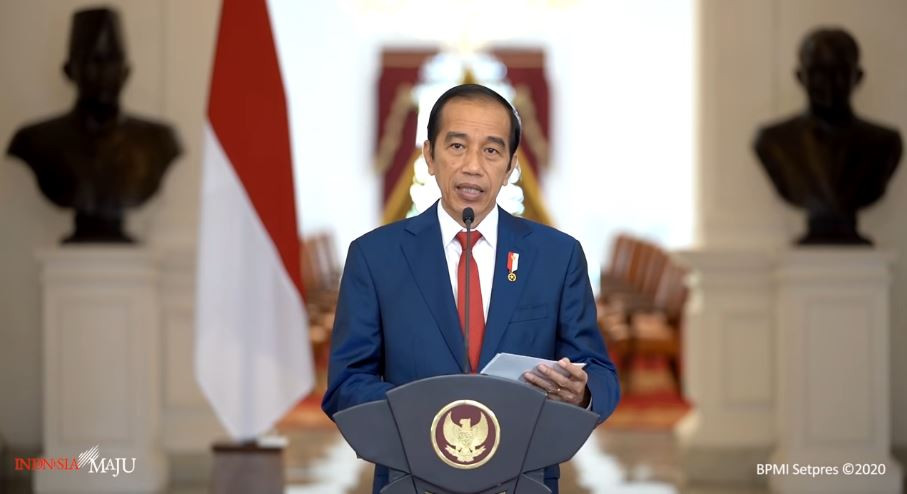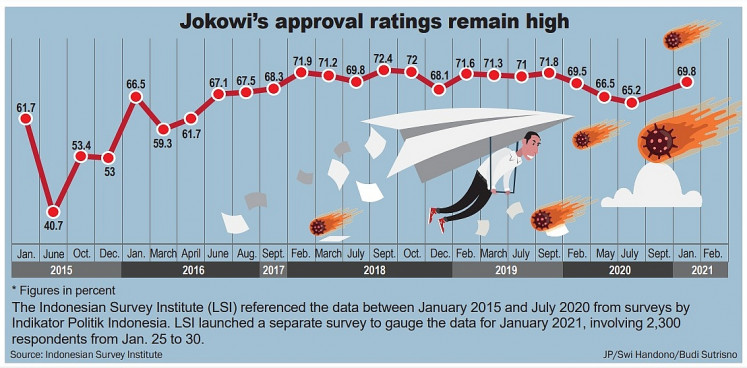Pandemic blunders fail to dent Jokowi’s popularity
President has stable approval ratings despite slew of controversial policies
Change Size

W
hen Indonesia surpassed 1 million COVID-19 cases on Jan. 27, painting a bleak picture of how the nation of 270 million people handled the deadly pandemic, nearly 70 percent of Indonesians said they were “satisfied” or “very satisfied” with President Joko “Jokowi” Widodo’s performance, according to recent polling data.
President Jokowi has had relatively stable approval ratings despite a slew of controversial policies taken by his administration since the beginning of the global health crisis, a feat that analysts say could be attributed to persistent political polarization, the absence of a strong and effective opposition and the media’s failure to challenge the government’s narrative on the pandemic situation in the country.
His approval ratings did fall from 71.8 percent in September 2019 to 65.2 percent in July 2020, about four months into the pandemic, when the economy was under severe pressure from newly imposed social-distancing policies, but then climbed to 69.8 percent in January this year, according to polling by the Indonesian Survey Institute (LSI).
About 85 percent of the respondents say they were pleased with the current economic situation, while between 77 and 83 percent shared similar sentiment about the political, security and law enforcement situation in the country. The survey, released on Tuesday, was conducted between Jan. 25 and 30, involving 2,300 respondents from across the country and with a margin of error of 2.9 percent.

Persistent political polarization
Jokowi’s approval ratings have remained relatively unchanged because the political polarization caused by the 2014 presidential election remains a factor in how people perceive his performance, LSI executive director Djayadi Hanan told The Jakarta Post on Tuesday.
“People who like Jokowi tend to always have a positive attitude toward him, even when his performance is not really that good,” he added.
Jokowi remains a divisive figure even after embracing his rival of the last two presidential elections, Prabowo Subianto, who now serves as his defense minister. This is why his approval ratings never exceed 80 percent, Djayadi said.
By comparison, former president Susilo Bambang Yudhoyono’s performance was rated positive by between 50 to 80 percent of the population during his terms. When Jokowi decided to reduce fuel subsidies in 2015, his ratings even plunged to 40.7 percent, the analyst said.
Burhanuddin Muhtadi, the executive director of Indikator, another pollster, concurred with Djayadi, saying that regardless of Jokowi’s performance, partisan attitudes would continue to favor him.
“Jokowi supporters tend to be satisfied with the President’s performance, while Prabowo’s supporters still tend to be dissatisfied, even though he is already part of [Jokowi’s Cabinet],” he told a virtual conference on Feb. 8.
Indikator has found that Jokowi’s approval ratings steadily declined from 69.5 percent in February 2020 to 62.9 percent this month. However, analysts say that the numbers only show that his popularity among the people remains stable.
Read also: We are not perfect: Moeldoko defends Jokowi-Ma’ruf’s first year in office
Lack of strong opposition
With the majority of political factions at the House of Representatives now part of the progovernment coalition, Jokowi has managed to build a strong coalition among the elites, leaving little room for meaningful opposition. This, analysts say, is another reason why he has been able to retain political stability and keep his ratings under control.
“Incumbents seem to poll well during this crisis, especially when there is no clearly defined opposition leader who is speaking out directly critiquing government policy. [President Rodrigo] Duterte polling at 90 percent in the Philippines would be another example,” Ross Tapsell, a senior lecturer and researcher at the Australian National University (ANU)’s College of Asia and the Pacific, said in an email interview.
Six factions controlling 427 of the 575 seats at the House have representatives in Jokowi’s Cabinet, leaving only three parties — the Democratic Party, the Prosperous Justice Party (PKS) and the National Mandate Party (PAN) — outside the government. Of the three parties, only the first two have declared themselves as the opposition.
“Only the Democrats and the PKS are in the opposition now. This is not an absence of a strong opposition, [Jokowi] practically has no opposition,” Adam Kamil, a researcher at Indikator told the Post.
Read also: Yearender 2020: What went wrong with Indonesia’s virus response?
Government narratives unchallenged
The uptick in Jokowi’s approval rating according to the LSI’s polling data came amid criticism from civil society groups and epidemiologists over a series of pandemic policies by the central government that they believe lack scientific basis and are apparently designed to protect the economy rather than save lives.
The government, for instance, was late in imposing strict social restrictions and conducting an effective testing-and-tracing policy at the beginning of the pandemic to prevent widespread community transmission. It even planned to pay influencers to lure foreign tourists at a time when other nations were shutting down borders.
A recent study by the Lowy Institute ranks Indonesia among the worst performers (85th out of 98 countries) in the global battle against the pandemic, along with India (86th), the United States (94th) and Mexico (97th). Indonesia is the worst performer in the region, with Singapore ranking 13th, Malaysia 16th and the Philippines 79th.
Indonesia’s economy shrank by 2.09 percent last year, the first annual GDP contraction since the 1998 financial crisis. With millions of people losing their jobs, the pandemic has pushed at least 2.6 million Indonesians into poverty.
“The pandemic is not the President’s fault,” Djayadi said, adding that the public judged how the President responded to it, and, while they were initially disappointed by the government’s response, they now viewed it more favorably.
Tapsell, meanwhile, suggested that, despite all the blunders, Jokowi’s communication strategy had been successful, citing the failure of the Indonesian media in general to challenge the government narratives.
“The main communications approach from the Jokowi government has been to say that the situation is difficult but is largely under control and is being handled effectively by the government. To a large extent, much of the media [especially online media] tends to report these statements uncritically,” he said.









